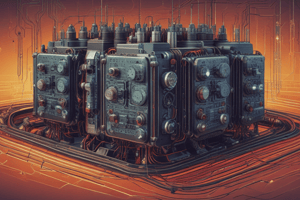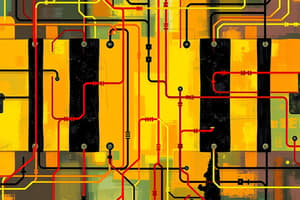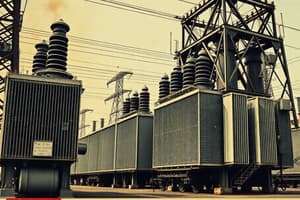Podcast
Questions and Answers
सर्किट में कौन-कौन से घटक होते हैं?
सर्किट में कौन-कौन से घटक होते हैं?
- संवेदकीय, प्रतिरोधकीय और तरंगगत घटक (correct)
- केवल संवेदकीय घटक
- केवल प्रतिरोधकीय घटक
- केवल प्रेरित घटक
ऊर्जा प्रणाली के साथ क्या संबंधित है?
ऊर्जा प्रणाली के साथ क्या संबंधित है?
- पावर जनरेशन प्लांट्स की देखरेख
- पावर आउटेज की अध्ययनन
- हाई पोटेंशियल लाइन्स का निर्माण
- प्रकाश उत्पादन संयंत्रों का डिज़ाइन (correct)
नियंत्रण प्रणाली में क्या प्रमुख विषय होता है?
नियंत्रण प्रणाली में क्या प्रमुख विषय होता है?
- प्राकृतिक प्रक्रिया का अध्ययन
- मानकरीत सिस्टम्स (correct)
- प्रतिरोधकीय सिस्टम्स
- संवेदकीय सिस्टम्स
संकेत और प्रणाली में क्या संबंध है?
संकेत और प्रणाली में क्या संबंध है?
'Control Systems' में कौन-कौन से पृथक होते हैं?
'Control Systems' में कौन-कौन से पृथक होते हैं?
'Electronic Devices' में सम्मिलित कौन-कौन से मुख्य समुपादन होते हैं?
'Electronic Devices' में सम्मिलित कौन-कौन से मुख्य समुपादन होते हैं?
इलेक्ट्रॉनिक डिवाइस के उदाहरण में कौन-कौन से साधन शामिल हैं?
इलेक्ट्रॉनिक डिवाइस के उदाहरण में कौन-कौन से साधन शामिल हैं?
सिग्नल्स और सिस्टम्स इंजीनियरिंग का क्या अध्ययन है?
सिग्नल्स और सिस्टम्स इंजीनियरिंग का क्या अध्ययन है?
कंट्रोल प्रणाली एन्जीनियरिंग के मुख्य लक्ष्य क्या हैं?
कंट्रोल प्रणाली एन्जीनियरिंग के मुख्य लक्ष्य क्या हैं?
सिग्नल और सिस्टम्स इंजीनियरिंग में प्रकारों के किसे प्रतिनिधित्व कर सकते हैं?
सिग्नल और सिस्टम्स इंजीनियरिंग में प्रकारों के किसे प्रतिनिधित्व कर सकते हैं?
कंट्रोल प्रणाली के लिए कौन-कौन सी क्रियाएं प्रमुख होती हैं?
कंट्रोल प्रणाली के लिए कौन-कौन सी क्रियाएं प्रमुख होती हैं?
'इलेक्ट्रॉनिक डिवाइस' के संरचनात्मक घटक कौन-कौन से होते हैं?
'इलेक्ट्रॉनिक डिवाइस' के संरचनात्मक घटक कौन-कौन से होते हैं?
Flashcards are hidden until you start studying
Study Notes
Exploring Electrical Engineering: A View of Circuits, Power Systems, Control, Signals, and Devices
Electrical engineering is a dynamic and broad field that encompasses a variety of subdisciplines, each contributing to the advancement of technology and our daily lives. In this article, we'll delve into the key aspects of electrical engineering, focusing on circuits, power systems, control systems, signals and systems, and electronic devices.
Circuits
Circuits are the fundamental building blocks of electrical engineering, consisting of resistive, capacitive, and inductive components connected together to perform specific functions such as amplifying signals, filtering noise, or performing logical operations. The design of circuits forms the basis for all electrical engineering projects, as each circuit is a combination of passive and active components that control the flow of electrical energy.
Power Systems
Power systems are concerned with the generation, transmission, and distribution of electricity across vast networks. Power engineers design and maintain high voltage transmission lines, power generation plants, and distribution systems, ensuring a reliable and efficient supply of electricity to homes and businesses. Power systems engineering also involves the study of power quality and the prevention of power outages.
Control Systems
Control systems engineering deals with the design, implementation, and analysis of systems that control physical processes. Control systems can be found in a wide range of applications, including automobiles, aircraft, and industrial processes. The main goals of control systems engineering are to ensure stability, performance, and robustness in the controlled system. Control systems are often implemented using feedback loops, where the output of the system is compared to the desired value, and an error signal is used to control the system.
Signals and Systems
Signals and systems engineering is the study of signals and their processing, transmission, and analysis. Signals can be continuous or discrete-time, and they can represent various types of information, such as audio, video, or control signals. Signals and systems engineering deals with the design and analysis of systems that process signals, such as filters, amplifiers, and communication systems. Signals and systems engineering is closely related to the fields of control systems and digital signal processing.
Electronic Devices
Electronic devices are the building blocks of modern electronic systems. Examples of electronic devices include transistors, diodes, and integrated circuits (ICs). Transistors are the fundamental components of electronic devices, as they allow for the amplification, switching, and controlling of electrical signals. Diodes are used to rectify AC signals and perform various other functions, while integrated circuits (ICs) contain multiple electronic components on a single chip, reducing the size and cost of electronic devices.
Electrical engineering is a dynamic and multifaceted discipline, offering a wealth of opportunities for graduates in a variety of sectors. Whether you are designing circuits, optimizing power systems, or creating new electronic devices, electrical engineering provides a rewarding and challenging career path for those with an interest in technology, mathematics, and physics.
Studying That Suits You
Use AI to generate personalized quizzes and flashcards to suit your learning preferences.



